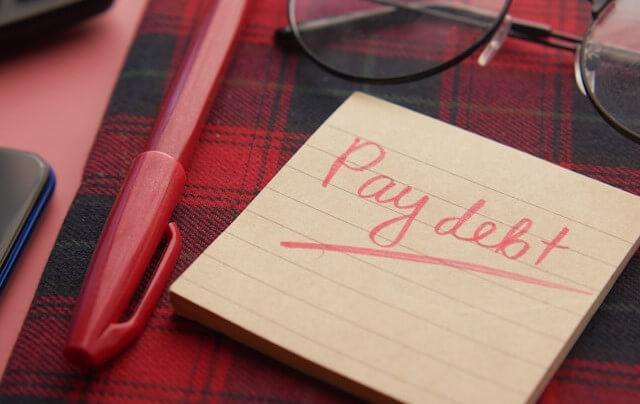Being in debt can cause a massive dent on your financial health if you have expert tips on how to get rid of it. And debt, no matter how big or small, can close some financial doors and hinder your ability to achieve your financial goals.
Naturally, you may be trying to do right by your creditors, paying what you should when you should.
But between paying your mortgage and covering essential utilities, it can feel like you’re barely keeping your head above water.
If you’re among the 340 million Americans owing consumer debts, it’s possible to switch into panic mode when you think of your debt.
But you don’t have to let your fear win, you can actually pay off your debts if you put your mind to it.
And you don’t have to do it alone. We are here to help. In this article, we’ve listed seven expert tips to help you get out of debt and regain your financial freedom.
Expert Tips for Getting Out of Debt
Here are expert tips to help you come out of debt as fast as you desire.
1. Review Your Income
This is the most logical first step to take. Since the funds you will use to pay off your debts will mostly come from your income, it’s wise to review it again.
Pull out a pen and paper and write down how much you make each month. Compare it to your monthly expenses and loan payments.
This will give you a clear picture of your financial situation and help you identify areas where you can cut back. It will also show you how much money you have left over to put towards paying off your debts.
If you find that your income is not enough to cover your expenses and debt payments, think of new ways to increase your income. In this case, you could take on a part-time job or try freelancing.
2. Create a Budget and Stick to It
This is basically the next step to take after reviewing your income. A budget is important at this stage because it helps you track your income and expenses.
List all of your monthly expenses, including rent or mortgage, utilities, groceries, transportation, and entertainment.
Then, compare your expenses to your income and identify areas where you can cut back.
When you’ve made a satisfactory budget, stick to it religiously. This will help you avoid overspending and ensure that you have enough money to pay off your debts each month.
Also Read: Guide on How to Improve Your Credit Score
3. Cut Expenses
Take a close look at your monthly expenses and identify areas where you can cut back. Do you really need that comfort shopping or monthly subscription to multiple streaming services?
Cutting out non-essential expenses can free up extra money that can be put towards debt repayment.
Say no to financial requests that drain you and mess with your well crafted budget. Remember that you’re trying to hit a financial goal, so be diplomatic if you must, but don’t spend money unnecessarily.
Occasionally, try as much you can to track your spending and identify areas where you can make adjustments. While cutting expenses, every dollar saved is a dollar that can be used to pay off your debt faster.
4. Pay the Small Debts First
There’s something about achieving a milestone that fires you up to do more. What we’re saying is: paying off even small loans gives you motivation to tackle larger ones.
Start by listing all your debts from smallest to largest. If, for instance, you have a credit card debt of $2000, an auto loan of $1200, and a personal loan of $5000, start by paying off the auto loan first.
Once that’s paid off, you’ll feel a sense of accomplishment that will motivate you to tackle the next debt on your list. Plus, paying off smaller debts can free up more money to put towards larger ones, helping you pay off your debt faster.
This snowball method not only accelerates your debt repayment but also keeps you motivated along the way.
Also Read: How to Teach Your Children About Money Early
5. Consider Debt Consolidation
Let’s talk about debt consolidation. Debt consolidation involves taking out a new loan to pay off your existing debts.
This can be a good option if you have multiple debts with high-interest rates. With this method, you can save money on interest and simplify your monthly payments.
There are several ways to consolidate your debts. It could be taking out a personal loan, transferring your credit card balances to a new card with a lower interest rate, or using a home equity loan or line of credit.
There’s a caveat though. Find out the terms of the new loan and make sure that you can afford the monthly payments before taking it.
6. Avoid Taking on New Debt
This is not just a tip. It’s a principle you may want to start living by. While you’re working on paying off your existing debts, it’s important to avoid taking on any new debt.
This means resisting the temptation to use your credit cards for unnecessary purchases and avoiding taking out any new loans unless absolutely necessary.
Instead, live within your means and save money wherever possible. This will help prevent you from getting yourself deeper into debt.
You need to understand that to pay off all your debts, you must close your eyes to even enticing loan offers so you don’t undo all the progress you’ve made earlier.
7. Negotiate with Creditors
While applying the other tips, you can also consider negotiating with the people you are owing.
Don’t be afraid to reach out to them and explain your situation. Many creditors are willing to work with you to create a more manageable repayment plan.
As you meet with them, you may be able to negotiate lower interest rates, reduced monthly payments, or even settle the debt for less than the full amount you owe.
One thing to keep in mind is that you need to be honest and transparent about your financial difficulties, because being dishonest can make matters even worse.
One Last Word on Getting Debt Free
Getting out of debt is not easy, and it won’t happen overnight. It requires hard work, dedication, and perseverance.
There will be setbacks along the way, but it’s important to stay positive and keep pushing forward. Celebrate your successes, no matter how small, and don’t get discouraged if progress seems slow.
Remember that every little bit counts, and as long as you stay focused and persistent, you will eventually reach your goal of becoming debt-free.
Don’t also neglect professional help. If push comes to shove and you are unsure where to turn, seek professional help.
Credit counseling agencies and financial advisors can provide personalized guidance and strategies to help you get out of debt. They can also negotiate with creditors on your behalf and help you create a realistic debt repayment plan for you.
Wrapping Up
In a nutshell, getting out of debt is entirely possible, although it requires a lot of discipline and determination.
But what is giving up eating out and shopping sprees compared to paying off all your debts? It’s a small price to pay, especially if you are looking to increase your credit score or generally get debt-free.
If you follow the expert tips we have outlined like reviewing your income, and snowballing your debts, you can take control of your finances and work towards a debt-free future.
So don’t lose hope. Keep pushing forward, and before you know it, you’ll be on the path to financial freedom.








